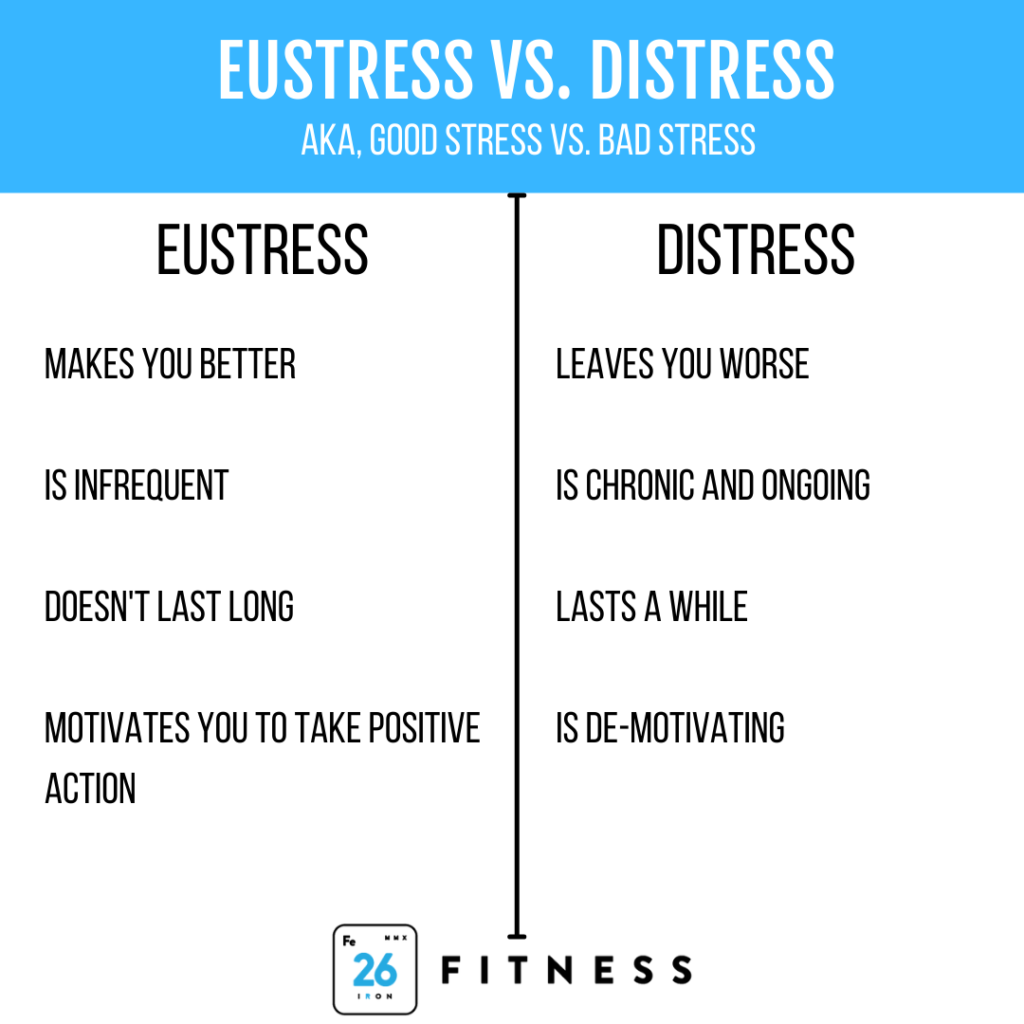What do you think of when you think of the word “stress”? Work deadlines? Hustle and bustle? Emotional angst? What most people don’t realize is that there are actually two forms of stress, and one of them is actually good for you! In this post, I’ll discuss eustress vs. distress, specifically as it relates to fitness.
But first, let’s talk about what the word stress even means, as well as the two types of it.
Types of Stress
It’s understandable if your brain immediately goes to, well…your brain when you think about the meaning of stress. But stress is more than just emotional discomfort.
From a medical standpoint, stress is simply a response to any physical, mental, or emotional challenge.
The response can be negative (distress). Or, it can be positive (eustress). And some of whether it’s positive or negative depends on individual interpretation. However, there are a few key differences between eustress and distress.

As you can see from our handy table on eustress vs. distress, eustress tends to be short-lived and (this is key) positive. Eustress changes you for the better.
By contrast, distress is ongoing and tends to break you down over time.
Hopefully, it goes without saying that eustress and distress can show up in lots of areas of life. A tough work project, for example, can cause eustress or distress. Distress would be a project that eats you alive for weeks on end–one that causes you to dread work and to feel ick even when you leave for the day. But it could be eustress if you find the project to be rewarding or stimulating, and you can find relief and balance at the end of the day.
It all comes down to duration, perceived effects on your body and psyche, and how well you recover from it.
Using the same criteria, we can also evaluate whether your training regimen is causing eustress or distress.
Eustress vs. Distress in Fitness
Before we talk about how to know if your training habits put you at risk of distress, let’s first just get an important point out of the way: Exercise is a stressor.
In fact, that’s an important part of how it makes you stronger and healthier.
Let’s say you push the weights on back squat day at the gym. Doing so stresses your muscles (and other parts of your body). You recover a day or two after, and then come back to the gym and work your muscles again. Over time, adaptation occurs–in this case, your muscles become stronger.
You can’t get stronger without stressing those muscles! And generally speaking, this is a good thing.
However, there are a few situations that might increase the odds that your habits both in and out of the gym might cause distress. These include:
- Failure to take regular rest days.
- Training too much in a single day (let’s face it–most of us don’t need two a days or workouts that last hours on end).
- Training hard when your stress outside the gym is too high.
- Not getting adequate sleep when you’re training hard.
- Inadequate calorie intake to support your training.
- Macro or micronutrient deficiencies.
Now, you might be looking at some of the things on this list and thinking, “What does this have to do with training?”
Remember how we said that a key distinction between eustress and distress is our ability to recover? Each of the items on this list is absolutely critical to recovery. You can’t recover well if you’re not eating well, sleeping well, and managing your stress outside of the gym.
And poor recovery means limited adaptation (aka, fewer gains), not to mention higher risk of injury and burnout.
With all of that in mind, let’s talk about how we can tell if your training and recovery habits are setting you up for distress.
Signs of Training-Related Distress
Think you might be pushing a little too hard at the gym?
Here are some signs you might need to pump the breaks:
- You can’t remember your last rest day.
- You keep getting sick, or you’re feeling run down in general.
- You’re constantly sore and tired.
- Motivation is at an all-time low, but you keep making yourself go to the gym.
- You’ve got lots of niggling injuries (or big ones).
- You’re a highly active lady who’s lost her period (and there’s no other good explanation for why).
If you recognize any of these signs, you’d likely benefit from dialing back the training and implementing a solid recovery plan. This includes eating well, getting 7-9 hours of sleep each night, incorporating strategies to offload mental stress (like our breath and exposure classes!), and scheduling at least 1-2 rest days per week.
Need a little help with any of these? We’d love to answer any questions you have about eustress vs. distress! Click here to schedule a free 15-minute consult.

